Natural Wine Staking Claim in Texas
By Harrison Young
Reporting Texas
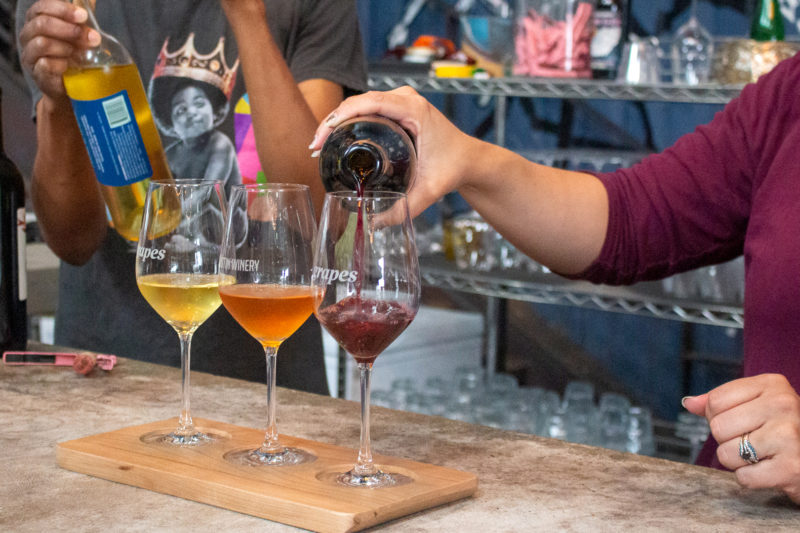
Bartender Elora Lee, 31, pours a glass of wine as The Austin Winery opens for business on Thursday, April 15, 2021, in Austin, Texas. Lindsey Staskus/Reporting Texas
Natural wine is getting more buzz — around the country and in Texas.
Natural wine is made with organically farmed grapes and fermented with yeast that grows naturally on the grapes. The fruit is also picked by hand, without the aid of machinery. Winemakers call the process “non-intervention” or “zero-zero,” meaning nothing is added and nothing is taken away during production.
This hands-off approach results in a unique taste and appearance. Natural wine can look cloudy due to particles that make it from the vine to the bottle, which can also lead to the wine re-fermenting inside the bottle. This doesn’t mean the wine is unsafe to drink, only that it’s free of additives such as sugar and lab-grown yeast that are often added to non-natural wine.
Cooper Anderson, head winemaker at The Austin Winery, said consumers’ desire for authenticity in their wine has fueled the demand for natural wine in Texas.
“I think people are looking for more transparency in production,” Anderson said. “We’re under no legal obligation to say ‘Hey, we added mega-purple to this to make it more purple-y,’” referencing larger, more mainstream wineries’ tendency to use non-natural additives.
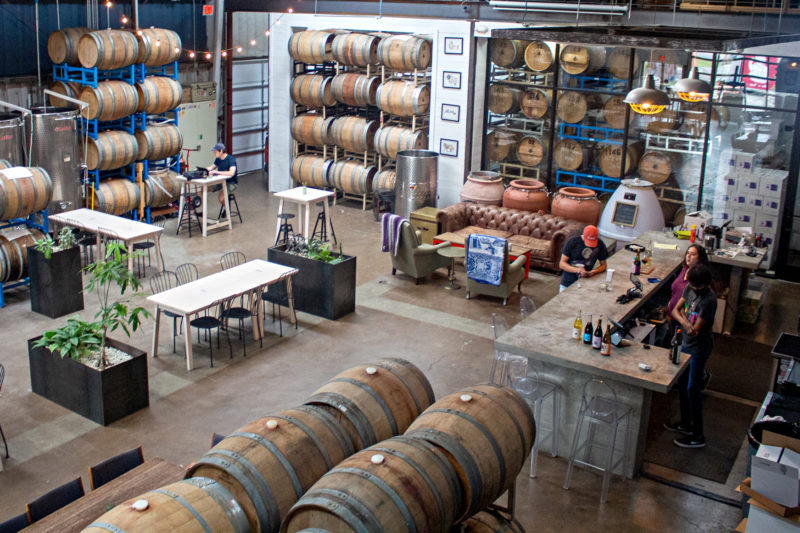
Employees of The Austin Winery prepare for customers to arrive on Thursday, April 15, 2021 in Austin, Texas. Lindsey Staskus/Reporting Texas
While natural wine is still a niche product and specific sales numbers are not available, the Texas wine market in general has seen “unprecedented growth” in the past few years, Natalia Velikova, assistant director of Texas Tech’s Wine Marketing Institute, said.
“Since the beginning of the pandemic, many consumers purposefully support small local businesses, including local wineries,” Velikova said, and that has meant a boon for Texas wineries.
The number of Texas wineries increased from 70 to 425 in the past 15 years. In 2020, Texas ranked as the fifth-largest wine producing state in the country after California, Washington, New York and Oregon, according to Wines Vines Analytics.
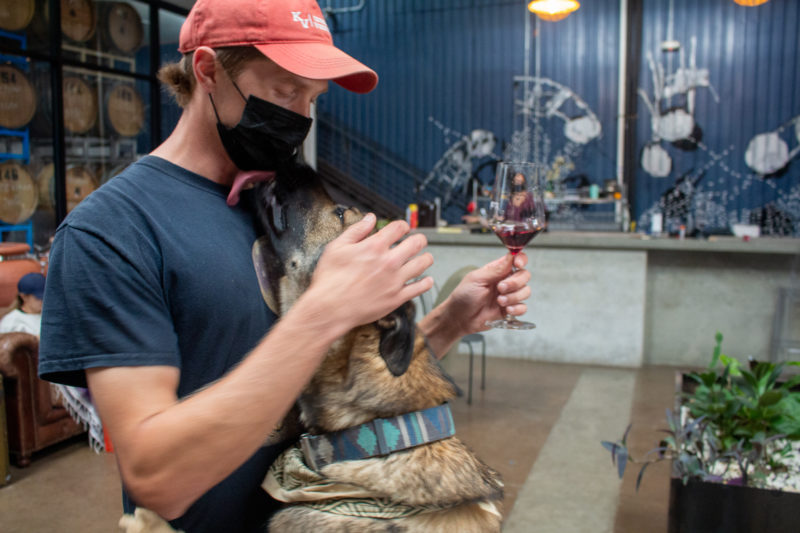
Andy, a 2-year-old German shepherd, jumps to greet her owner, Cooper Anderson, 33, while he holds a glass of red wine inside The Austin Winery on Thursday, April 15, 2021, in Austin, Texas. Lindsey Staskus/Reporting Texas
There are distinctions between natural and organic wine, another wine category that has seen recent growth. Organic wine has a legal definition — the U.S. Department of Agriculture forbids the use of certain elements, like sulfites, but does not exclude additives such as sugar or fake flavoring.
Natural wine has no legal definition. All natural wines are organic because the grapes are farmed organically, but not all organic wines are natural wines because they often contain additives and are not harvested by hand.
Ross McLachlan, CEO of The Austin Winery, said a third of the company’s total production is natural wine. The company sells as many bottles to California as it does in Texas due to Californians’ jaded attitude towards their own wine, McLachlan said.
“There’s this huge element of exploration and trying new things, you know. If you’ve been drinking wine or in the industry for the last twenty-odd years, you’ve had everything from California and Oregon,” McLachlan added.
Henry Crowson is the owner and sole employee of Crowson Wines in Johnson City. Producing good natural wine is all about terroir, the French word for “land,” Crowson said. The characteristics of the region where the wine was produced affect the finished product.
Terroir can be used as marketing strategy, but there is an emotional aspect as well. “If the farmer is having a great year in their personal life, wines should reflect that,” Crowson said. “The tender love and care they give their grapevines will be reflected in the finished product.”
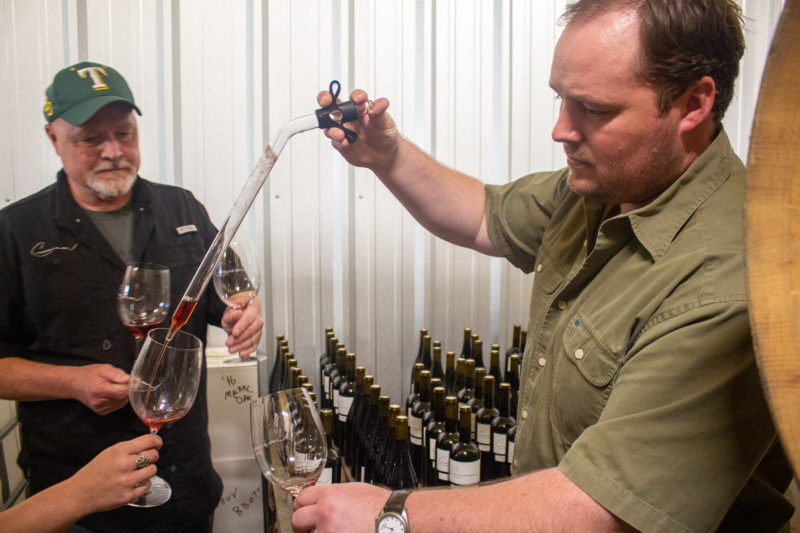
Kenny Crowson, left, stands next to his son Henry Crowson, right, who holds a wine thief and pours a small amount of wine from a cask at Crowson Wines located in Johnson City, Texas on Friday, April 9, 2021. The Crowsons processed 130 cases of wine when they first started the winery in 2016. The father and son now process over 2,000 cases of wine each year. Lindsey Staskus/Reporting Texas
Crowson first got a taste of natural wine in 2015 when drinking a Zinfandel from Sonoma, Calif. “The ingredients were grapes, and that was it,” he said. Crowson decided to start producing his own natural wine. “I wanted to make what I considered to be the best wine,” he said.
Jennifer Beckmann is the sommelier at Rerooted Winery in San Antonio. Natural wine “tends to be kind of a love or hate style of wine,” Beckmann said. “It’s a relatively raw style of winemaking.”
“It’s a unique voice, as far as winemaking goes,” she added.
While legacy wine regions like California and Oregon are known for specific types of wines, Texas has more variety. “Each region is so dependent on having one set of a variety that works well for them, and Texas isn’t quite as symptomatic of that,” Beckman said.
The Texas Wine and Grape Growers Association, or TWGGA, acts as a central hub for people in the wine business, according to TWGGA president Roxanne Myers. Part of the association’s work includes tracking and consulting on wine industry legislation at the Capitol. It also employs a lobbyist in Austin.
“We pay attention to all those pieces of legislation and canvas the industry and make sure we’re one solid front,” Myers said.
Asked about TWGGA’s involvement with natural wine, Myers said there was none that she knew of, expressing unfamiliarity with natural wine in general.
“I don’t know if that’s a term or if there’s a definition,” Myers said.
The fact that mainstream wine industry insiders lack knowledge about natural wine doesn’t bother Crowson. “I can see how it’s possible to be disconnected from this style of wine,” he said.
Crowson is convinced that the reputation of natural wine will continue to expand as more and more wine drinkers are exposed to it.
“The soulfulness of wine is the most beautiful aspect,” Crowson said.
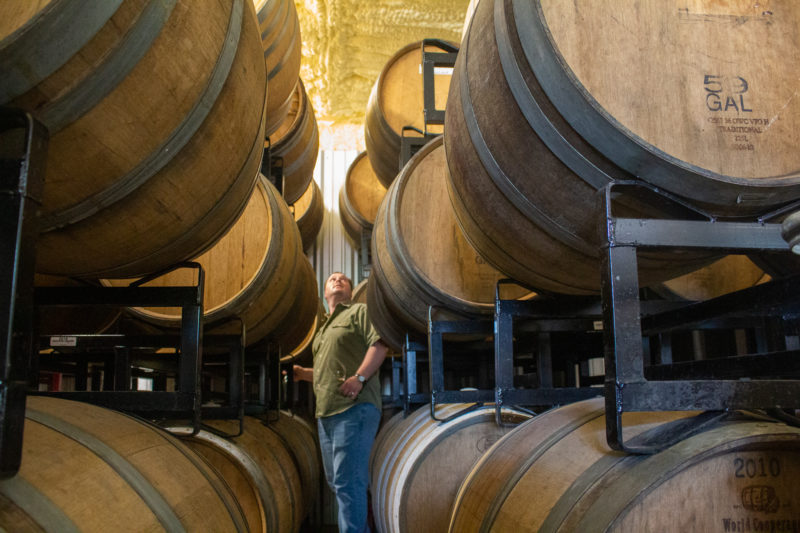
Henry Crowson, 29, stands among casks of wine at Crowson Wines in Johnson City, Texas, 48 miles west of Austin, Texas on Friday, April 9, 2021. Lindsey Staskus/Reporting Texas